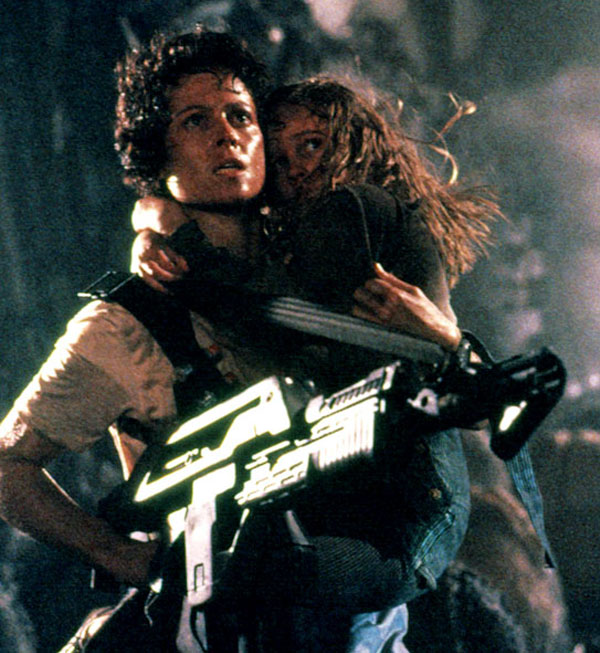A Brief History of The Queen of Sci-Fi Cinema, Sigourney Weaver

The news of Sigourney Weaver’s upcoming appearance in Ghostbusters inspired us to reflect back on her impressive roles in sci-fi cinema, which eventually earned her “The Queen of Sci-Fi” as a nickname. Much like our recent video spotlight on Guillermo del Toro, this video tracks the highs and lows of Sigourney Weaver’s career. If you like what you see, please take note that we’ve recently put a “Video” tab at the top of this page, which will take you straight to our YouTube channel for more videos like these.
Below, read the transcript of our video about Sigourney Weaver’s career.
***
A picture’s worth a thousand words, and the image of Sigourney Weaver holding a young girl in one arm and a flame thrower in the other does more to sum up what her career has represented for women in sci-fi cinema than I ever could. But I’ll do my best.
Sigourney Weaver, who’s often referred to as “The Sci-Fi Queen” — not the Princess, nor the Damsel, nor the Madonna, nor the Whore, but the Matriarch — paved the way for her moniker with her performance as Ellen Ripley in the Alien franchise. That grim, woman-focused story inspired other science fiction stories across all media, from Metroid to Onyx. Her performance in the role of Ripley, which was originally intended for a male actor, rocketed her to stardom and proved that a woman-led franchise could capture audience’s hearts … and explode out of their chests, seeking more converts.
In spite of her matriarchal moniker, though, Weaver hasn’t just played bad-ass maternal figures like Ellen Ripley. Her name’s recently made headlines due to her plan to appear in the upcoming Ghostbusters film; in the first Ghostbusters, Weaver played a character who seemed like a straightforward love interest, but who later gets possessed by dark forces — which gave Weaver the opportunity to show off both her comedic timing and her acting chops. Unlike the Alien films, the Ghostbusters movies had to take scary fare and transform it into over-the-top hilarity rather than high-tension drama; Weaver has shown her ability to master both with ease.
In Galaxy Quest, Weaver showed her comedic chops yet again, but this time she did her own twist on yet another character trope: the blonde bombshell. Even though all of these examples have been science fiction, Weaver’s portrayal of each woman couldn’t be more different; in every case, the result is humanizing rather than forgettable.
Perhaps Sigourney Weaver has simply gotten lucky with the scripts she’s been offered. Or perhaps she’s shown her own ability to work with very little, as with her excellent work in Ghostbusters; Dana’s not given much to do, yet Sigourney’s delivery of “There is no Dana, only Zuul” makes that moment memorable.
Sometimes, however, even Weaver’s talents can’t save a lazy idea. For example, let’s look at her performance in Avatar, James Cameron’s science fiction twist on Disney’s Pocahontas (okay, so it wasn’t an intentional adaptation of Pocahontas — but the similarities abound!). Weaver plays a maternal figure once more, but she’s given little to do, and few opportunities to show off her versatility; if she had any memorable line reads, they must not have made it into the final cut. All I can remember is Weaver delivering her lines in an uncharacteristic monotone. Unfortunately, her IMDB tells us that she’s signed on for a handful more of these.
She’s also attached to a will-they-won’t-they Alien sequel with Chappie’s Neill Blomkamp. The Alien franchise seems to have spun out in a few confusing directions since its strong beginnings, but Weaver has said she’d like to see a conclusion to Ripley’s story. Meanwhile, Alien director Ridley Scott has his own ideas about how much longer the franchise could go on, given that he’s got several more Prometheus follow-up ideas in the hopper. I wouldn’t want to compare this to all the inexplicable Avatar follow-ups that Weaver’s signed on to do, since that seems unfair, but it sure does seem like the Sci-Fi Queen has gotten stuck with a case of sequelitis. Even her appearance in Ghostbusters will be a nostalgia trip.
Maybe that’s okay, though. The only new idea that had Sigourney Weaver “in talks” this year is an ill-conceived action film called Tomboy, in which Weaver would play a villainous surgeon with a penchant for performing gender reassignment surgery on people against their consent. That’s definitely science fiction, but I’m just not that hopeful about Hollywood’s knowledge on that particular topic. Hopefully that film will get shelved. Or thrown out the airlock.
But what is the state of science fiction cinema, right now? And where do older female actors fit in? Sigourney Weaver still inspires excitement and nostalgia in us all because we remember her as a groundbreaking performer and leader for women in sci-fi, but simply putting her in the background of a new sci-fi flick isn’t enough to make it praiseworthy. She also needs to be given something to do, beyond just acting as a symbolic footnote in the history of heroines.
What’s more, much of Sigourney Weaver’s most memorable work happened decades ago; she deserves better opportunities to showcase her abilities, and so do other women actors in sci-fi of all ages, backgrounds, and ethnicities. We can’t just point to Ellen Ripley and say, “good enough.” There are other stories to be told, perhaps ones that could star the talents of Zoe Saldana, Lupita Nyong’o, Charlize Theron, Daisy Ridley, or some as-yet-unknown actress. I wouldn’t want to see Weaver dethroned — but it would be nice to see some more Queens of Sci-Fi ruling alongside her.
—Please make note of The Mary Sue’s general comment policy.—
Do you follow The Mary Sue on Twitter, Facebook, Tumblr, Pinterest, & Google +?
Have a tip we should know? tips@themarysue.com